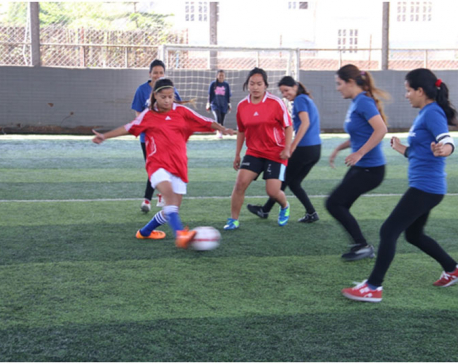
OR
Stakeholders want laws barring women from working abroad as housemaids amended
Published On: April 20, 2018 06:44 AM NPT By: Republica | @RepublicaNepal
KATHMANDU, April 20: Various stakeholders have urged the government to amend protectionist migration law and policies which restrict women from going aboard to work as housemaids. They argued that the government’s decision to ban women from going aboard to work as housemaids has escalated gender inequality and forced women to reach labor destinations illegally.
Addressing at a program organized by the Human Innovative Development and Research Pvt Ltd, Equal Access and UN Women, speakers said the government’s inconsistency on female migrant workers has caused problems instead of giving a way out to unemployment in the country. They demanded that the government lift the ban on women going aboard to work as housemaids, arguing that the decision contradicts the constitutional provision of ensuring gender equality in all areas including employment.
“Protectionist policies don’t protect gender equality,” said women rights activist Bharati Silwal Giri adding, Citing the then Legislature-Parliament’s International Relations and Labor Committee (IRLC)’s recommendation, the government in April 2017 banned women from going for oversees employment. Right activists say women are forced to choose illegal route to go to Gulf countries in absence of basic employment in the country.
The ban was imposed following a field study in five Gulf countries- Qatar, Saudi Arabia, United Arab Emirates and Kuwait. Female migrant workers, according to them, are reaching the Gulf countries through illegal routes mostly via India and Sri Lanka.
Issuing a circular to all the concerned ministries including the Ministry of Labor and Employment (MoLE), the Ministry of Foreign Affairs and the Ministry of Home Affairs had stressed the “the need for developing required legal framework and safety nets to protect rights of domestic workers before allowing them to go aboard”.
Participants said since Nepal has not signed labor agreement on domestic workers with any country so far, migrant workers-both male and female-are suffering the most in their respective labor destinations. Since the Kafala system, or sponsorship system based on Islamic Sharia law, regulates the domestic works instead of the regular labor law, diplomatic missions in the labor receiving countries have failed to rescue workers during trouble and provide them legal redress.
“Such national and international restrictions imposed on women because of protective approach have deprived the women of economic gain,” Kiran Rupakheti, government secretary at Province 2, who has also expertise on labor migration and trafficking said presenting a work paper.
You May Like This

Futsal for the women, by the women and of the women!
KATHMANDU, March 19: WE United Project launched the Mahila Premier League (MPL) on March 18 at Grassroots Recreational Center in Mandikhatar. ... Read More...

Laws could be amended for investment in productive sectors
KATHMANDU, June 7: Deputy Prime Minister and Minister for Defense Ishwar Pokharel has said that the target of sustainable development of... Read More...

Experience of working with abused women in India
Nazma is just a representative of numerous women across the world who have experienced domestic abuse at some point in... Read More...




Just In
- MoHP cautions docs working in govt hospitals not to work in private ones
- Over 400,000 tourists visited Mustang by road last year
- 19 hydropower projects to be showcased at investment summit
- Global oil and gold prices surge as Israel retaliates against Iran
- Sajha Yatayat cancels CEO appointment process for lack of candidates
- Govt padlocks Nepal Scouts’ property illegally occupied by NC lawmaker Deepak Khadka
- FWEAN meets with President Paudel to solicit support for women entrepreneurship
- Koshi provincial assembly passes resolution motion calling for special session by majority votes







_20220508065243.jpg)





Leave A Comment